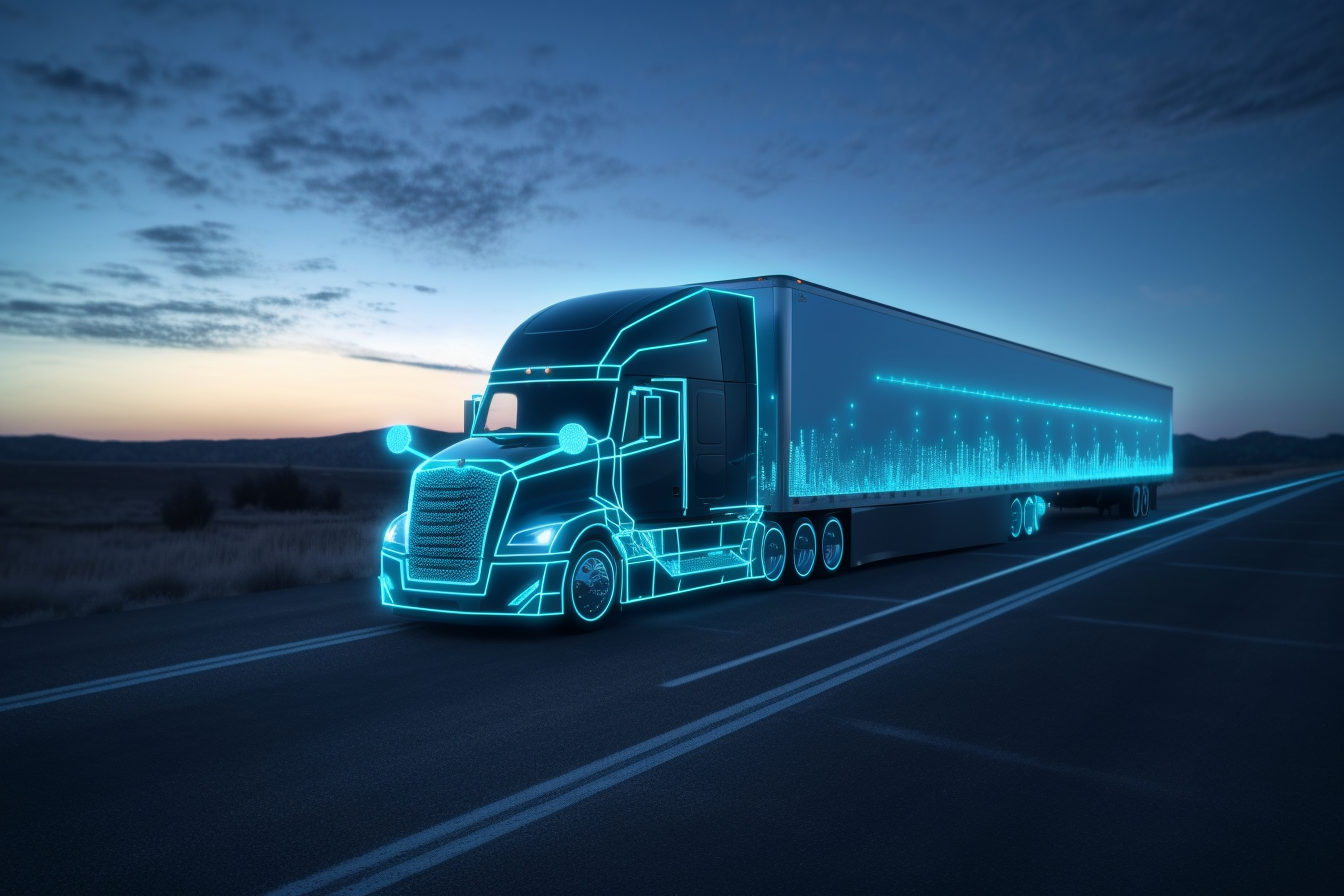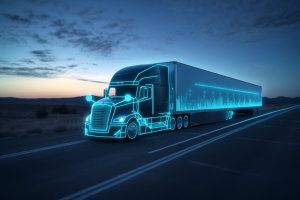Exclusive Content!
AI in Trucking Industry: A Game-Changer for Logistics and Beyond
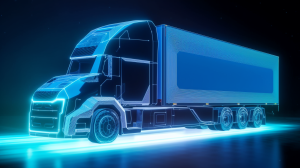
The development of autonomous trucks is undoubtedly one of the most significant advancements in the AI in the trucking industry.
The AI in the trucking industry is driving a new era of innovation and efficiency. Artificial intelligence (AI) has already made significant strides in various sectors, and the trucking industry is no exception. With the rapid development of autonomous trucks, AI-powered logistics, and smart transportation, it’s evident that the future of trucking is increasingly being shaped by these cutting-edge technologies.
In this article, we’ll explore seven key ways AI is transforming the trucking industry, including AI-driven fleet management, AI-based route optimization, and machine learning applications. We’ll also discuss the benefits and challenges of integrating AI into the trucking industry.
Enjoying our insights?
Subscribe to our newsletter to keep up with the latest industry trends and developments.
Stay Informed
1. Autonomous Trucks: The Future of Transportation
The development of autonomous trucks is undoubtedly one of the most significant advancements in the AI in trucking industry. These self-driving vehicles have the potential to revolutionize transportation by reducing driver fatigue, increasing fuel efficiency, and improving road safety.
Companies like Tesla, Waymo, and Daimler are investing heavily in autonomous truck technology, with some models already undergoing extensive testing. As these technologies continue to advance, we can expect a future where driverless trucks become a more common sight on our roads.
2. AI-Powered Logistics: Streamlining Supply Chain Management
AI-based logistics solutions are streamlining supply chain management and driving significant improvements in efficiency. By leveraging machine learning algorithms and data analytics, these systems can:
- Optimize scheduling
- Track shipments in real-time
- Predict potential issues before they arise
AI-powered logistics platforms enable companies to make data-driven decisions and automate complex processes, resulting in reduced operational costs, improved customer satisfaction, and increased profitability.
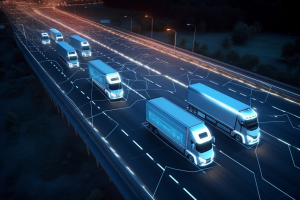
AI-powered logistics platforms enable companies to make data-driven decisions and automate complex processes.
3. Smart Transportation: Reducing Emissions and Improving Efficiency
As environmental concerns become increasingly important, AI in trucking industry is playing a vital role in promoting sustainable transportation. AI-driven solutions can analyze vast amounts of data to optimize fuel consumption and reduce emissions, resulting in a more eco-friendly transportation system.
Smart transportation systems also enhance safety by using advanced sensors and cameras to monitor road conditions, detect obstacles, and prevent accidents.
4. AI-Driven Fleet Management: Maximizing Performance and Minimizing Downtime
AI-driven fleet management systems are transforming how trucking companies manage their vehicles. By utilizing machine learning algorithms, these systems can:
- Predict vehicle maintenance needs
- Monitor driver performance
- Optimize routes to maximize efficiency and minimize downtime
Companies that implement AI-driven fleet management solutions can expect increased productivity, reduced maintenance costs, and improved overall performance.
5. AI-Based Route Optimization: Ensuring On-Time Deliveries and Reducing Costs
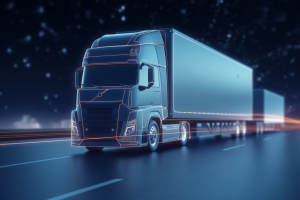
AI-based route optimization not only improves efficiency but also reduces the environmental impact of the trucking industry.
Route optimization is a critical aspect of the trucking industry, and AI-based solutions are revolutionizing this process. By analyzing historical data, traffic patterns, and weather conditions, AI can predict the most efficient routes, ensuring on-time deliveries and reducing transportation costs.
AI-based route optimization not only improves efficiency but also reduces the environmental impact of the trucking industry by minimizing fuel consumption and emissions.
6. Machine Learning in Trucking: Predictive Analytics for Improved Decision-Making
Machine learning algorithms are being increasingly utilized in the trucking industry to analyze large datasets and provide valuable insights. These AI-powered systems can:
- Predict demand patterns
- Identify potential bottlenecks
- Optimize resource allocation for improved decision-making and overall efficiency
By leveraging machine learning in trucking, companies can stay ahead of the competition, adapt to market changes, and continuously improve their operations.
7. AI and Cybersecurity: Protecting Critical Data and Systems
With the increasing reliance on AI and digital systems in the trucking industry, protecting critical data and systems from cyber threats is of utmost importance. AI-driven cybersecurity solutions can help safeguard sensitive information and detect potential vulnerabilities, ensuring a more secure and reliable transportation network.
AI-based cybersecurity tools can:
- Identify and prevent cyber attacks in real-time
- Analyze and predict potential threats
- Automate incident response and remediation
Implementing AI-powered cybersecurity measures can help trucking companies protect their valuable data and maintain the trust of their customers and partners.
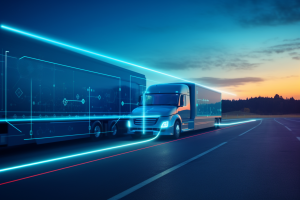
Machine learning algorithms are being increasingly utilized in the trucking industry to analyze large datasets and provide valuable insights.
Artificial Intelligence Benefits: Unlocking New Opportunities
The integration of AI in the trucking industry offers numerous benefits, including:
- Improved safety: AI-powered systems can monitor driver behavior, predict potential accidents, and implement preventative measures to enhance road safety.
- Increased efficiency: AI-driven solutions optimize fuel consumption, route planning, and fleet management, resulting in cost savings and improved productivity.
- Enhanced customer satisfaction: AI-powered logistics and route optimization ensure timely deliveries and better communication with customers.
- Environmental sustainability: AI technologies can help minimize fuel consumption and emissions, contributing to a greener transportation system.
- Data-driven decision-making: Machine learning algorithms can analyze vast amounts of data, providing valuable insights for informed decision-making and strategic planning.
Challenges and Considerations for AI in Trucking Industry
While the benefits of AI in the trucking industry are substantial, there are also challenges and considerations that need to be addressed, such as:
- Job displacement: The rise of autonomous trucks could potentially displace human drivers, creating employment concerns.
- Data privacy and security: The increased reliance on data and connected systems raises concerns about data privacy and cybersecurity.
- Infrastructure development: The widespread adoption of AI and autonomous vehicles will require significant investments in infrastructure, such as smart roads and charging stations.
- Regulatory hurdles: The introduction of AI-driven technologies in the trucking industry will need to overcome regulatory barriers and ensure compliance with existing and future legislation.
In conclusion, AI is playing a pivotal role in the transformation of the trucking industry, making it more efficient, sustainable, and safe. Key AI advancements include the development of autonomous trucks, logistics, smart transportation systems, fleet management, route optimization, machine learning applications, and AI-enhanced cybersecurity. These technologies are streamlining supply chain management, improving fuel efficiency, enhancing road safety, and reducing operational costs.
However, there are challenges to be addressed, such as job displacement, data privacy and security concerns, infrastructure development, and regulatory hurdles. By carefully considering these issues and implementing AI responsibly, the trucking industry can continue to evolve and embrace the vast potential of artificial intelligence to revolutionize logistics and transportation for the better.
For further reading on AI in trucking industry and the future of transportation click here & check out these articles and resources from tanktransport.com:
These links provide additional information on specific AI technologies and solutions, explore these innovations further and understand how they are being implemented in the trucking industry.
- Daimler Trucks – Autonomous Driving – Daimler’s official page on their autonomous truck technology development.
- Tesla Semi – Tesla’s official page on their electric and semi-autonomous truck.
- Waymo Via – Waymo’s official page on their autonomous trucking and logistics solutions.
- Samsara Fleet Management – Samsara’s fleet management solutions that leverage AI and machine learning.
- ORTEC Inventory Routing and Dispatch – ORTEC’s AI-based route optimization solution for transportation and logistics.
- Geotab Fleet Management – Geotab’s fleet management platform that utilizes AI and data analytics for optimization and efficiency.

